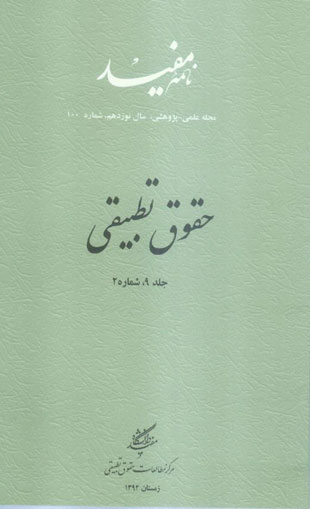The Death of Tadedy and the Birth of Rationalism
Author(s):
Abstract:
Nietzche (1844-1900) gives a definition for tragedy which is in no way similar to its popular sense in history, especially in the sense used in modern literature. In fact, Nietzsche considers tragedy as an ontological view of human existence. His interpretation of tragedy rests upon the Schopenhauer’s philosophy as well as aesthetic ideals of Richard Vagner. At that time, this young philosopher was deeply influenced by his master’s aspirations (ideals) in philosophy and music. Nietzche holds that the primary human concern has been that of death and mortality. Man, among other creatures, is the only living being who is aware of the fact of his death which, in turn, makes him or her turn to art. His creativity in escaping from death manifests itself in art, and tragedy is the culmination of man’s creativity in art. This great literary form, in its primitive course of development, mainifests itself in the chorus. The chorus, together with their ecstatic joyful songs, know as dithyramb, are creatures called satyrs, who appear half-man, half-goat (goat-like), accompanying Dionysus, the god of wine, ecstasy and drunkedness in his pleasures and delights. Satyrs and Dionysus are manifestations of transient unity of existence. In this unitary and fundamental state, man stands in a live relation with the universe, the other human beings and their origins. The culmination of tragic art lies in this very live relation in which man is at once the Subject and the Object. It is only in this transcendent art that man finds some meaning for his life and justifies his mortality as originated in the reality of horrendous transient earthly existence to overcome his fear of mortality. Acconrding to Nietzcche, tragedy comes to an end with the appearance of the first seeds of rationalism symbolized in Socratism.Nietzsche’s definition of tragedy, compared to the definition given for it by the philosophers of the Enlightenment, along with the death of tragedy after the birth of rationalism, to which he referred as Socratism, constitute the theme of the present article.
Language:
Persian
Published:
مجله نامه مفید, Volume:9 Issue: 39, 2004
Page:
121
magiran.com/p146216
دانلود و مطالعه متن این مقاله با یکی از روشهای زیر امکان پذیر است:
اشتراک شخصی
با عضویت و پرداخت آنلاین حق اشتراک یکساله به مبلغ 1,390,000ريال میتوانید 70 عنوان مطلب دانلود کنید!
اشتراک سازمانی
به کتابخانه دانشگاه یا محل کار خود پیشنهاد کنید تا اشتراک سازمانی این پایگاه را برای دسترسی نامحدود همه کاربران به متن مطالب تهیه نمایند!
توجه!
- حق عضویت دریافتی صرف حمایت از نشریات عضو و نگهداری، تکمیل و توسعه مگیران میشود.
- پرداخت حق اشتراک و دانلود مقالات اجازه بازنشر آن در سایر رسانههای چاپی و دیجیتال را به کاربر نمیدهد.
In order to view content subscription is required
Personal subscription
Subscribe magiran.com for 70 € euros via PayPal and download 70 articles during a year.
Organization subscription
Please contact us to subscribe your university or library for unlimited access!


